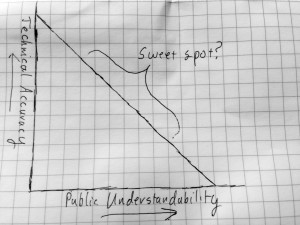Writing simply sometimes isn’t simple. Turning scientific and technical prose into stories for the general public isn’t easy.
It was a struggle when I made a living as a newspaper reporter. It still is as a government communicator. Often, the struggle was with a source — whether someone I interviewed as a reporter or I work with as a communicator — who disagreed with my suggestions on how to write something in a simpler fashion.
I’ve taken to using a simple graphic to illustrate the challenge. Here it is, as drawn on my favorite writing tool, a pocket notebook, and transferred via a cell phone picture:

The words we use in science, engineering or any other technical field aren’t familiar to the general public. So we use them — translate them, as it were — and in the process arguably lose the technical accuracy of the language we use.
The trick is finding a spot on the downward sloping line that we can live with. And how, you may ask? Well, here’s my attempt at working with a paragraph from a somewhat technical report. It’s the annual report by the American Society of Civil Engineers. I picked it because I love this report, and respect and enjoy working with engineers.
There’s nothing wrong with the writing in this report. It’s appropriate for the audience the report is written for. It’s just that the general public would find it a bit much.
So let’s see if we can make this paragraph more readable for more people — how far we can go toward public understandability.
Let me know where you would stop in the comments.
I used three main resources to work with this paragraph.
The first is StoryToolz, where you can paste text and get readability statistics.
The second is WordNet, a database that links words together, sort of like a scientific thesaurus.
The third is the Collins thesaurus.
Here’s the paragraph from the report:
“We know that investing in infrastructure is essential to support healthy, vibrant communities. Infrastructure is also critical for long-term economic growth, increasing GDP, employment, household income, and exports. The reverse is also true – without prioritizing our nation’s infrastructure needs, deteriorating conditions can become a drag on the economy.”
The average grade level in terms of readability is 16.3. So let’s assume not everyone we want to reach is halfway through college and try writing it differently.
My first rewrite uses some simpler words and shorter sentences:
“Good roads, bridges, sewer and drinking water pipes, sewage treatment and drinking water plants, and power lines support our lifestyles. Infrastructure also helps our economy, household incomes and exports. Without more support, deteriorating infrastructure can hold back our economy.”
Average grade level: 13.7. Not quite where it could be for a busy, general audience. So let’s try shortening and simplifying a bit more:
“Roads, bridges, wastewater and drinking water systems, and power lines support our lifestyles. Good infrastructure also helps our economy and incomes grow. Letting our infrastructure decline will hurt our economy.”
Average grade level: 12.6. Getting there. Let’s try getting rid of a few words, such as wastewater and industries that seem to be causing problems. Let’s also experiment with leaving the last sentence out, because it seems to be causing problems.
“Good roads and bridges help us travel safely. Water treatment plants keep us and our rivers and lakes healthy. Reliable power lines bring electricity to our homes and businesses. Good infrastructure makes our lives better and helps our economy grow.”
Average grade level: 8.7. That’s pretty good.
But would you go that far down the slope with your writing? Did we leave out something that’s too important to skip?
Craig Lincoln is part of the GovLoop Featured Blogger program, where we feature blog posts by government voices from all across the country (and world!). To see more Featured Blogger posts, click here.





Interesting article, Craig! I deal with striking the balance between jargon and common knowledge in my writing all the time. Sometimes the simplest writing is the most compelling; it’s easy to forget that. These are some great tools you’ve put in here, I’ll have to check them out!
This is great. I work in government IT, and communicating our simplified messages to employees (not to mention the public!) is a constant challenge. I’ll definitely try the tools you reference here.
Great post! I agree, good writing is simple writing. No one wants to get a headache reading something they should be enjoying. It was very helpful having you walk readers through steps to make their writing more clear and easy to read.
Thanks for the link to StoryToolz. Great little applet, and bookmarked . I was pleased to see that something I sent to colleagues yesterday netted a 13.5 reading level, without trying, and without losing any analytic power. I fed some draft FAQ sections for something I’ll need to post for federal employees later this year, and was pleased and relieved to see they came up with an average 12.5 rating. Whew!
Certainly one of the writing-reflexes, so many of us have a hard time holding back, is the use of big words and fancy phrases, for rhetorical purposes. We thrown them about to convey seriousness, to say “Hey, buddy, I *KNOW* stuff!”, but also like it’s secret password to the clubhouse, such that only the “righteous” can enter. Do they clarify, add precision, or weight? Sometimes, and sometimes not. One writer in the public administration field whose work I often come across, seems dead-set on using every word in the dictionary, and packing in as many per sentence as he can. Kudos to him The result is that his writing is so dense, so thick, that I come out the other side exhausted and none the wiser. I grabbed a simple abstract of his, Storytooled it, and it came out with an average reading-grade level of 17.8. Don’t try reading this at home, kids, unless you ‘ve successfully defended your Master’s thesis, and are working on your doctoral comps.
We tend to forget the purpose of our writing, sometimes. Ultimately, the goal of any expository writing is that someone should be able to read it ONCE, understand it enough to remember it, and be able to turn around and paraphrase it to a third party, without losing any of the gist. Certainly, technical language can be inserted if that helps it along, but the overarching goal is conveyability.
Of course, while you’re busy making it understandable, there’s no reason to *not* make it beautiful and pleasant to read. A little bit of verbal parsley, and a canteloupe wedge at the side can make even the plainest grilled cheese sandwich of text feel like a royal treat.
Definitely, I agree with your article. On the flip side, trying to write and convey ideas/informations to the general public in a very simplistic manner (with a readability of around 8.5 or below) could be a slap on their faces. They are assumed as less intelligent and uneducated. Regardless of whether the information is technical or not, most readers read something of interest to them. Interesting reading translates to understanding.
Great sites but unfortunately, the Marine Corps network blocks StoryToolz. Do you know of any others? Great information and very helpful. I run into the problem of having been beaten into writing for the “Ivory Tower” while in college and now needing to write more concisely for Marine Corps purposes although it does seem that the Corps has been corrupted and wants more fluff than I remember in the past.
Great article! I struggle to explain this to my colleagues at work. I write the staff reports or agenda memos for our City Commissioners. These reports are used to explain the project we are asking them to approve. So the language needs to be concise but not technical. Our Departments own the projects and are very close the project so it is easy for them to explain so THEY understand it.
What I tell my folks is to write the information/staff report so “A person of average intelligence with no prior knowledge of the topic will understand the project.” Similar to a newspaper article.
MS World also has a readability tool in the spelling/grammar section. It may have to be turned on so Google your version of word and it should tell you how to activate the readability tool.
I think your final version did leave out a key message of the original report: “We need to spend money to maintain our infrastructure, and we need to spend the available funds wisely.”
[…] Consider this blog the bridge that connects you (the tech user) with the tech innovators and policy makers. I vow to keep things as simple as I can without watering down the issue. One of our featured GovLoop bloggers refers to this as the sweet spot. […]
Great post. I had always wondered if there were tools like StoryToolz and Wordnet but never looked into it because I did not write much anymore. I plan to do more writing so I will definitely look into tools that can help make me a better writer.